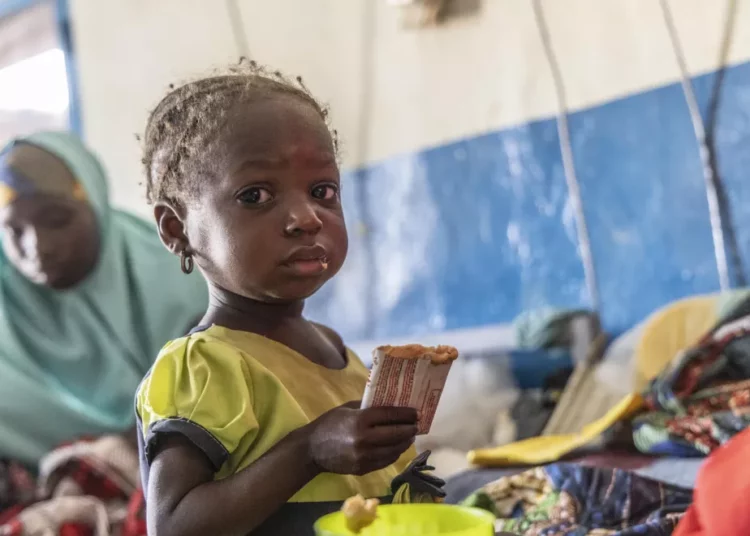
In the BAY states of Borno, Adamawa, and Yobe in Northeast Nigeria, malnutrition remains a dire challenge, threatening the health and future of millions of children. According to UNICEF 2.8 million children under five years old, along with pregnant and lactating women, require urgent nutritional intervention.
Without these services, an estimated 1.7 million people across the BAY states risk being afflicted by acute malnutrition in 2024. Also, the 2023 lean season Nutrition and Food Security Surveillance (NFSS) Round 13 conducted across the BAY states, estimated that the prevalence of global acute malnutrition (GAM) among children under 5 years in Borno is 10.
2 percent, 8.0 percent in Yobe and 4.0 percent in Adamawa.
This also means that an estimated 511,807 children under five suffer from Sever Acute Malnutrition annually, requiring urgent interventions to save their lives. However, amidst these grim statistics, hope shines in small communities where women are championing change. One of such communities is Layin Jere in Borno State, where grassroots initiatives are led by inspiring women like Mrs.
Usaina Abba Ibrahim. Trained by UNICEF, Usaina is at the forefront of a campaign aimed at transforming nutrition practices in her community. Usaina’s work involves going door to door, educating mothers about the importance of exclusive breastfeeding and nutrient-rich local foods.
Despite initial resistance, her persistence has paid off, with women like Aisha Muhammed, a mother of six, becoming advocates of exclusive breastfeeding after witnessing the health improvements in their children. “When I saw the result of exclusive breastfeeding in my fifth baby, I decided to continue,” Aisha shared, highlighting the clear differences in her children’s health. The community’s approach also incorporates basic yet effective hygiene practices.
Given the area’s poverty, Usaina teaches the use of ash as a substitute for soap. This innovation ensures hygiene practices remain accessible and sustainable. The impact of these grassroots efforts is remarkable.
The women of Layin Jere have formed two support groups, Alheri and Godiya, where they share knowledge and empower each other. These groups focus on child nutrition from pregnancy through the first two years of life, emphasising the role of mothers in monitoring their children’s health. Through these sessions, women learn to use the Mid-Upper Arm Circumference (MUAC) tape to detect early signs of malnutrition and refer their children for further care.
UNICEF’s support extends beyond Layin Jere. Across the BAY states, more than 4,000 women-led support groups have been established to combat malnutrition. Women like Usaina are not just improving nutrition in their communities; they are breaking barriers and challenging long-held beliefs.
Community leaders like Bulama Mustapha have witnessed the transformation firsthand, noting a significant decline in child illness and a surge in awareness and commitment among parents. To bolster these community-led initiatives, UNICEF has integrated nutrition programs into 765 outpatient treatment sites and 50 stabilisation centers across the BAY states. UNICEF is also collaborating with local governments to establish the Child Nutrition Fund (CNF), a financing mechanism to provide essential supplies like Ready-to-Use Therapeutic Food (RUTF).
Officer-in-Charge, UNICEF nutrition manager, Mrs Priscilla Bayo, emphasised the importance of this multifaceted approach, saying the women support group has achieve results in Borno Adamawa and Yobe states. According to her, “They are not only saving lives but also empowering themselves and their communities. Their courage and determination are a testament to the resilience of the human spirit.
As they continue their fight against malnutrition, they are inspiring others to join their cause and create a healthier future for their children” On his part, UNICEF’s chief of Borno field office, Dr. Tushar Rane, said UNICEF is the lead partner for the Nutrition Sector. “Currently, there are 46 partners (14 international non- governmental organizations (INGOs) and 32 national non-governmental organizations (NNGOs)), as well as 2 observers (MSF and ICRC), supporting nutrition activities in the states alongside other UN agencies.
“Nutrition programmes are integrated within government health facilities where there are 765 outpatient treatment programme (OTP) sites in the BAY states providing treatment for children with SAM without medical complications, and 50 Stabilization Centers (SCs) treating SAM with medical complications. Only 63 person of the 714 wards in the BAY states provide nutrition services. “With support from UNICEF and donors such as the United Kingdom Government (UKAid) and the German Ministry for Economic Cooperation and Development (BMZ), among other donors, Government across the BAY states are currently supporting 4,383 child nutrition mobilisers (CNMs) supporting malnutrition screening at the community levels.
The CNMs are an important link in the nutrition system. They reinforce nutrition best practices in the communities and, from house to house, they build the capacity of mothers to screen their children,” he explained. The results of these initiatives are encouraging.
In 2023, over 460,000 children were treated for acute malnutrition, marking a 37 percent increase in coverage to the previous year. Community-driven actions, combined with structured support from UNICEF and partners, are paving the way for a healthier future in Northeast Nigeria..














